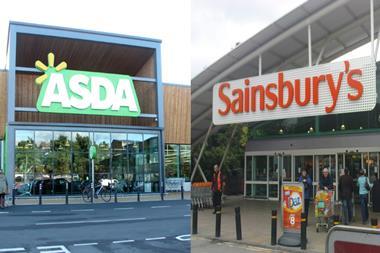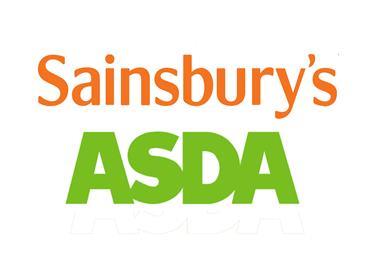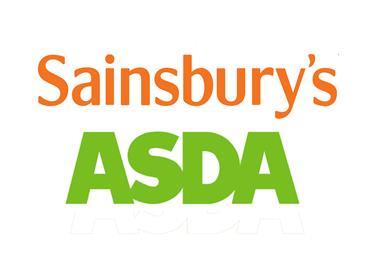Retail commentators have reacted to the proposed merger of Sainsbury’s and Asda, two of the UK’s biggest supermarkets.
The deal would see more than 2,800 Sainsbury’s, Asda and Argos stores - and several of the UK’s most-visited retail websites - trade under one combined business.
The proposed merger is subject to approval by the Competition and Markets Authority (CMA) and shareholders.
James Lowman, chief executive of the Association of Convenience Stores (ACS)
“Convenience retailers will be thinking about the knock-on effect of a Sainsbury’s/Asda merger on their businesses and on this sector.
”What will be the strategy for the Sainsbury’s Local convenience stores, and will the combined business look to engage with independents through a wholesale or franchise model – something Sainsbury’s has looked at in recent months? What will happen to buying power in the grocery market, and how will this impact on suppliers and on smaller retailers and wholesalers? What will be the implications for the fuel retailing market from these two large fuel retailers coming together?
“The Competition and Markets Authority will look at this merger and needs to consider these questions as part of that inquiry. Consumers win when there is vibrant competition and choice, and people increasingly fulfil their shopping needs through a variety of large and small stores, online shopping and eating out of the home. The CMA needs to think carefully about these changing shopping behaviours and consider the full implications of this deal.”
Chris Edger, professor of multi-unit leadership at Birmingham City University’s Business School
“The announcement that Sainsbury’s is planning a tie-up with Asda begs the question; why? Obviously to consolidate the market (due to hard discounter and online competitive pressure) and increase the geographical footprint of the combined business.
“Increased buying power will also reduce overall costs, making the combined entity more capable of surviving impending headwinds.
”The reality is that combining these two mid-sized players, operating in different consumer paradigms (quality vs. value) will be messy and complicated. Witness Morrisons’ takeover of Safeway 15 years ago. Although Sainsbury’s has claimed that Asda will remain as a separate operational unit, this seems a desperate case of creating scale rather than growth.”
“The reality is that combining these two mid-sized players, operating in different consumer paradigms (quality vs. value) will be messy and complicated.”
Freddie Lait, Tesco shareholder and founder of Latitude Investment Management
“As a Tesco shareholder we think a successful merger between Sainsbury’s and Asda will create short term opportunities and longer term stability and rationality, adding value to the Tesco value proposition:
- The new entity will be forced to sell or close some stores, which will benefit Tesco and Morrisons, while causing disruption to the new business.
- More concentrated market structures tend to derive greater aggregate profit pools so, in the medium term, we expect this to be a supply side tailwind for the sector.
- Tesco has widened its pricing gap versus its peers over the past few years so any benefit from deal synergies is required just to ease the pricing gap.
- The deal will take at least a year to close, through which period Tesco will be able to further demonstrate the newfound resilience of their business model, as well as seeing growth upside from the Booker integration.”
Catherine Shuttleworth, ceo of shopper and retail marketing agency Savvy
“We were always expecting something to happen to consolidate the grocery market.
“The middle ground has been squeezed the most by the inevitable march and expandability of the discounters, a reinvigorated Tesco with Booker under its wing is less arrogant and more relevant than with support from suppliers and conversion with shoppers, so the potential of Sainsbury’s and Asda joining forces creates a new dimension for the UK grocery market.”
Tim Roache, general secretary of GMB, the union for Asda workers
“It remains to be seen if this ‘supermarket sweepstake’ is the real deal or a bargain basement ready meal.
“Hundreds of thousands of workers stand to be affected, and all know such announcements tend to be followed by management speak like ‘rationalisation’ in the name of ‘efficiency’. What that usually means is job losses or cuts to pay, terms and conditions which would be wholly unacceptable. Not least because Asda workers have already voluntarily agreed to change their contracts to be more flexible in order to play their part and help their employer be more profitable.”
“It is quite right to be asking now in whose interests this proposed merger is being tabled. Is it workers and customers or the shareholders and speculators not happy with the hundreds of millions they already make in a year?”
“The events of the last few days have left a bitter taste in the mouth of Asda workers.
“Imagine turning up to your Saturday afternoon shifts only to learn this news, with no word from your employer at all - just speculation in the media. Our members are concerned for their futures and angry they’ve been kept in the dark.”
Richard Curry, food retail specialist and partner at property consultancy and agents Rapleys.
“Digging below the surface, we might read this as being phase two of Sainsbury’s strategy of pushing into the discount market – with Asda traditionally having a reputation for value and a core customer base which is, generally speaking, a different demographic to the average Sainsbury’s shopper.
“With the Asda deal, Sainsbury’s is potentially getting a huge footprint and loyal customer base which, together with the prospect of reduced supplier costs, on paper looks like it could be a formidable discount operator.
“At the same time, it shouldn’t be forgotten that both Asda and Sainsbury’s sweet spot is in food retail, and many of the stores Sainsbury’s are acquiring are just too big for the market these days. The fact is that many food retailers are now facing the challenge of having significant surplus space because of historic expansion strategies – an issue Sainsbury’s itself sought to mitigate with the acquisition of Argos. Asda’s policy has generally been based on very large volume stores and, while it has a decent non-food range, the format on the whole is not optimised around the core food product.
“Looking ahead, if the CMA forces a fire sale of stores, the irony is that the likely buyers are just those brands – Aldi and Lidl – who Sainsbury’s are looking to defend against.”
The independents’ view
Bay Bashir, owner of Lifestyle Express Belle Vue Convenience Store, Middlesbrough
“It doesn’t surprise me in the slightest that Sainsbury’s and Asda have done a deal because that’s the way the market seems to be going at the moment.
“What does surprise me is the speed at which things are going in this sector. It almost seems like an over-night thing when you don’t hear anything about these big players struggling and then they just hit the wall and look to combine with each other.
“There is no stability in the market at the moment. I don’t see why the CMA won’t approve the Sainsbury’s-Asda merger after they waved the Tesco-Booker deal through. Once these things are agreed they seem like a certainty.”
Jag Brar, owner of Londis Cricklade, Wiltshire
“It’s a bit of a surprise for us really. I think it has to be a reaction to the Tesco-Booker merger with both companies looking for more buying power.
“I just think it can’t be good for consumers and the industry in the long term. Sainsbury’s and Asda are such massive companies and will have a lot of control over the sector.
“I think most of the talks were done before the Tesco-Booker announcement. I just don’t know what’s going to happen to Sainsbury’s and Asda stores in the same town – surely they will close distribution centres too because what’s the point of having more space than you need.
“Suppliers are the ones who are going to suffer because they will just get squeezed on price. The business world that we live in now is quite cut-throat which probably explains why they have merged.
“We are still only just getting used to the idea of being owned by Tesco, and still waiting to see the benefits filter through, let alone worrying about competitors.
“I hope in a couple of years Sainsbury’s and Asda will trade as normal but the ways things are at the moment you can never get too comfortable.”
















![Muller_Bliss_Whipped_Elevated_Lemon_Meringue_Pie_FF[87]](https://d2dyh47stel7w4.cloudfront.net/Pictures/100x67/2/2/2/352222_muller_bliss_whipped_elevated_lemon_meringue_pie_ff87_462652_crop.jpg)


























No comments yet